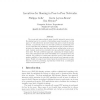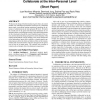66 search results - page 11 / 14 » A Game Theoretical Model for Adversarial Learning |
177
click to vote
Publication
We introduce a class of learning problems where the agent is presented with a series of tasks. Intuitively, if there is relation among those tasks, then the information gained duri...
123
click to vote
WELCOM
2001
Springer
15 years 4 months ago
2001
Springer
The recent and unprecedented surge of public interest in peer-to-peer file sharing has led to a variety of interesting research questions. In this paper, we will address the ince...
ATAL
2008
Springer
15 years 1 months ago
2008
Springer
We discuss the design of the Intermediary Agent's brain, the control module of an embodied conversational virtual peer in a simulation game aimed at providing learning experi...
EUROCRYPT
1999
Springer
15 years 3 months ago
1999
Springer
We consider the problem of basing Oblivious Transfer (OT) and Bit Commitment (BC), with information theoretic security, on seemingly weaker primitives. We introduce a general model...
100
click to vote
ATAL
2010
Springer
15 years 23 days ago
2010
Springer
Planning how to interact against bounded memory and unbounded memory learning opponents needs different treatment. Thus far, however, work in this area has shown how to design pla...



